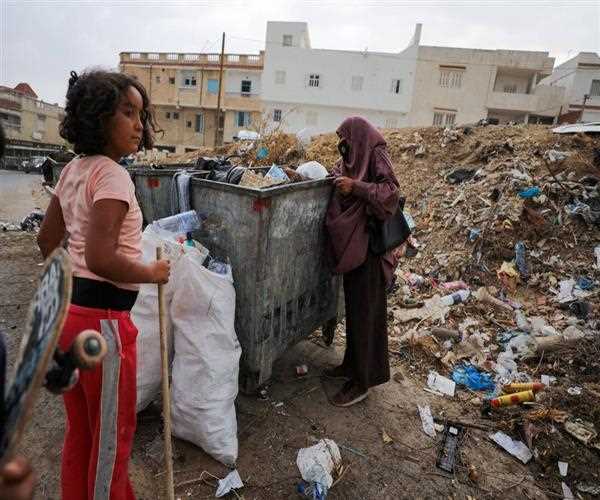
30-Mar-2024 , Updated on 4/3/2024 6:09:31 AM
Why the Arab countries are getting poor?
The Arabic world includes over 20 nations with different economies, each one presenting its own unique circumstances. On one side, there are wealthy states like Saudi Arabia and Qatar, with a huge number of rich people and infrastructures, and on the other side there are devastating wars taking place in Syria and Yemen making them one of the most underdeveloped countries in the world. And so we can say that this area contains a large variety of economic conditions.
However, within this diversity lies a stark reality: shocking inequalities in income and growth of countries. While pondering this question of economic inequality amongst the arab countries, we are brought back to asking the critical questions about the causes of poverty in these nations.
Depth of Economic Struggles
It is an accepted fact in the Arab world that oil is an abundant resource; however, all countries haven’t made it work for the development of their economies. The most contributing factor here is geopolitical instability which is slowing down progress for the countries hopeful of economic prosperity such as Iraq, Syria and Yemen which are in constant wars and conflicts.
On the other hand, the global problems and economic crisis hit small economies in the arab league such as Jordan, Lebanon, Sudan and Tunisia with stronger intensity. They struggle to lift their people out of poverty when the global economy is slowing down and holds back efforts of these countries. Furthermore, the Arab region has the reputation of being the most unequal region globally. This explains that the economic disparity is responsible for the continuity of poverty in many countries.
Impact of Conflicts and Instability on Human Security
The continuous wars in Arab states have a great impact in the fields of poverty and economic growth. Countries like Iraq, Syria and Yemen are suffering major losses as a consequence of long-lasting wars which are manifested in the form of poverty, dislocated people, and damaged infrastructures.
For example, Syria is destined to be overburdened with extreme poverty, as the results of a total absence of established infrastructure or the ongoing civil war have forced approximately 80% its population to live below the poverty line.
In the same way, the oil-dependent Iraq still struggles to overcome the poverty rise in which it was caught while the US-led invasion, civil war and changing price of oil dominate the picture. Besides its oil reserves, Iraq fails to modify the poverty patterns in its own country, an example of what may be even more harmful to prosperity because of a long period of instability.
In Yemen, the conflict with Saudi Arabia have made the poverty conditions worse and worse as the poverty rates of Yemeni soared from 42% to an unexpected 54.5%. The devastating conflict which aroused humanitarian disasters has caused impoverishment of the Yemenis million people and has shown interaction between conflicts and economic issues in the Arab countries.
Effects of Global Pandemics and Natural Disasters
While both the poor and the rich in the Arab region are facing numerous economic challenges, the problems are more visible in countries with low income. There are some economies that are heavily dependent on sectors such as tourism and manufacturing based industries. By forcing measures of lock downs and restricting movements during COVID Pandemic, these countries were seriously affected. The effect of the pandemic had been overwhelmingly felt by small and medium enterprises (SMEs), which in turn, had worsened unemployment and the conditions for poor people.
In addition, droughts, floods, and heatwaves, together with other adverse natural disasters, end in economic depression of the Arab countries. Agricultural activities as well as food insecurity these are the main disasters that these disasters will disrupt. Limited resources will also increase the strain of these resources. For instance, the Youth Envoy of the UN President of the 27th UN Climate Change Conference highlighted the mental health issues present in Arab youth, the suffering of which was also mentioned along with the multidimensional nature of economic difficulties of the region.
Role of International Corporations
In contrast to economic issues, the magnet to attract international corporations as a stimulant of economic growth in some Arab nation, for example, Morocco is used. American businesses with an August presence in the area include PepsiCo, CitiBank, General Electric, and Coca-Cola. These companies play a major role in providing employment and realizing local economic growth.
Nevertheless, the economic limitations mean that the small Arab countries lie out of the focus of the wealthy multinational companies. Countries such as Comoros have unskilled economy sector in which the most opportunity is in the tourism sector. Some Arab countries make economic gains from the heavy investments and cooperation with international companies, which are less applicable to the other Arab states in the region, consequently increasing socioeconomic disparities among Arab nations.
Conclusion
The economic hardships, of the Arab countries, result from a complex interaction of factors that includes conflicts, political instability, pandemics and natural disasters among some of them. Dealing with these issues not only requires the governments on themselves but also the involvement and combined action of the international community. In the fight against poverty, initiatives regarding obtaining peace and sustainable economic development are essential to avoid middle income traps in Arab region. By tackling the causes of economic inequality and implementing an inclusive growth model, Arab countries will lead the way to a more prosperous and fair environment for all their citizens.

Student
An MBA in finance imparts and improves management aptitude, inventive ability, critical thinking ability, and so forth. It offers a real-time experience that fabricates a staunch career foundation for students and working professionals. It helps them to thoroughly understand the financial sector.
Comments
Join Our Newsletter
Subscribe to our newsletter to receive emails about new views posts, releases and updates.
Copyright 2010 - 2026 MindStick Software Pvt. Ltd. All Rights Reserved Privacy Policy | Terms & Conditions | Cookie Policy